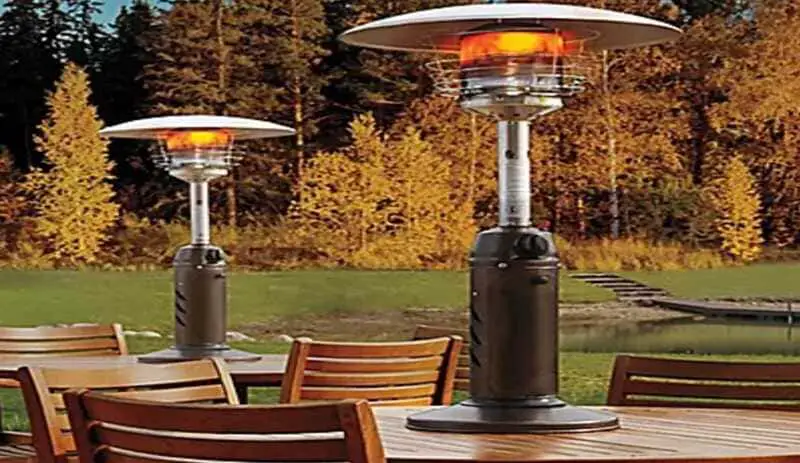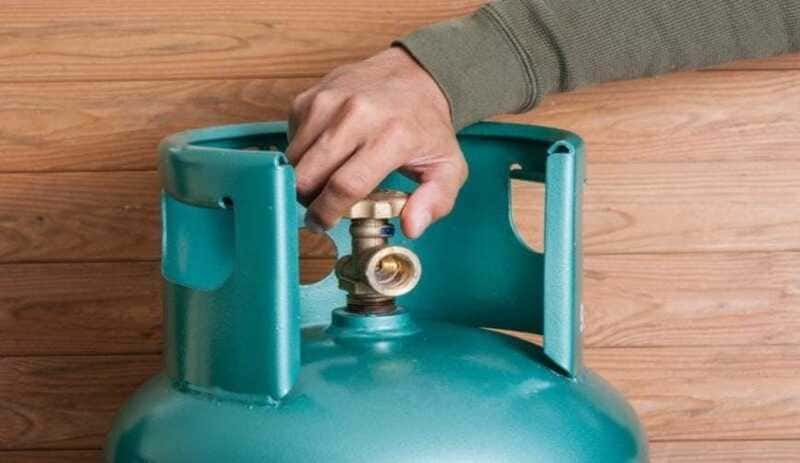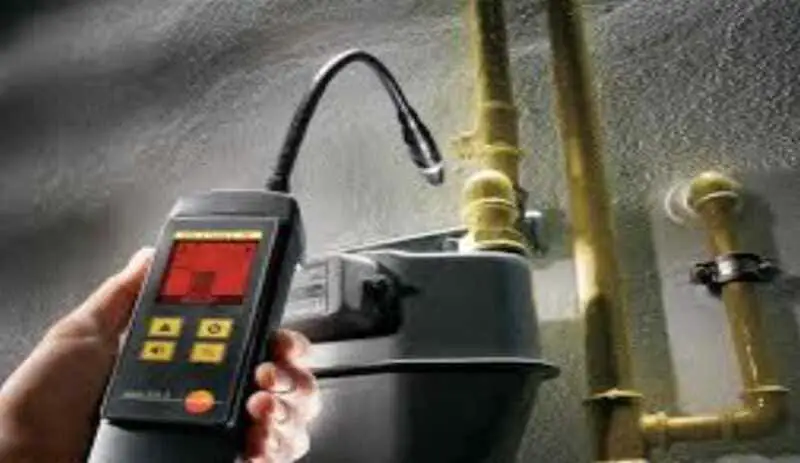In the cold months, the garage can become an essential space for a variety of activities, from do-it-yourself projects to car maintenance tasks.
In search of comfort, many choose to use propane heaters to keep the cold at bay in this environment. However, behind the warm and cozy atmosphere these devices can provide, lurk significant risks that should not be overlooked.

This article aims to shed light on the potential risks of propane heaters in the garage and highlight the essential precautions every homeowner should keep in mind when using this type of heating. From gas leaks to improper venting, we will explore the key risks and offer guidance on how to enjoy a warm and safe garage during the winter months.
Safety is paramount, and understanding the challenges inherent in propane heaters is the first step in ensuring a hazard-free work and leisure environment.
What are propane heaters?
These devices work by the controlled burning of propane, a highly flammable gas, to generate heat in the surrounding environment. The combustion of propane produces heat and water vapor as byproducts, making these heaters a popular choice for many people looking to heat their garage during the winter.
However, despite the benefits they offer, it is crucial to be aware of the risks of propane heaters in the garage. The flammable nature of propane means that there is the potential danger of gas leaks, which can trigger fires or even explosions in an enclosed environment such as a garage. In addition, burning propane consumes oxygen and produces carbon monoxide, a poisonous, odorless gas that can accumulate in the air if ventilation is inadequate. The combination of these risks makes it critical to understand how propane heaters work and what safety measures should be implemented to mitigate any potential hazards.
Advantages and uses of propane heaters.
Before thoroughly developing the topic of the risks of propane heaters in the garage, it is prudent to talk about the advantages of propane heaters and why they are in constant use.
One of the main advantages of these devices lies in their energy efficiency. Propane heaters are capable of generating heat quickly and efficiently, which means that the garage environment can be raised to a comfortable temperature in no time. This efficiency is not only beneficial to the well-being of those using the space, but can also be an advantage in terms of energy consumption.

The versatility of propane heaters is another highlight. In situations where the installation of central heating systems is not feasible, propane heaters offer a convenient solution. In workshops where manual work requiring a constant temperature is performed, these heaters provide a friendlier environment for projects and workers. In addition, in garages that have been converted into living spaces, propane heaters can keep the area at a comfortable temperature without the need to install more complex heating systems.
However, it is critical to recognize that, despite their advantages, propane heaters also present risks, especially when used in an environment such as a garage. The possibility of gas leaks and carbon monoxide emissions are real threats that cannot be overlooked. Safety must be a priority when using these devices.
Associated safety risks:
Propane Leak Hazard.
One of the most concerning hazards associated with propane heaters in the garage is the possibility of gas leaks. These leaks can occur due to a variety of reasons, such as faulty connections, damaged piping, or even aging heater components. In an enclosed environment such as a garage, where ventilation may be limited, a propane leak can lead to serious consequences.
Propane is a highly flammable gas and, in the presence of an ignition source, can trigger fires or explosions. The accumulation of propane in the air can create an explosive mixture that can be detonated by a spark, open flame or even an electrical device that generates heat. A simple ignition of a light, an electrical switch or a spark from operating equipment can have catastrophic results if propane is present in the environment.
The potential consequences of a propane leak in the garage are extremely serious. A fire caused by ignition of the gas can spread rapidly and destroy the space and the objects it contains. In more serious cases, the buildup of propane can cause an explosion, generating a destructive shock wave that can cause structural damage, injury and loss of life. The impact of a fire or explosion in an enclosed environment such as a garage can be devastating, affecting not only the space itself, but also the home and the safety of those nearby.
It is essential to address these risks proactively. Proper propane heater installation, regular maintenance and inspection of pipes and connections are essential steps to prevent gas leaks. In addition, education on how to identify and act upon a potential propane leak can make all the difference in the safety of a propane heater environment in the garage. In the next section, we will further explore the safety measures and precautions that should be taken to minimize the risks associated with these heating devices.
Inadequate ventilation.
The importance of proper ventilation in the garage when using propane heaters cannot be underestimated. One of the most insidious risks is the buildup of noxious gases, such as carbon monoxide, which can be a direct result of inadequate ventilation. Carbon monoxide is a colorless, odorless gas that is produced when propane burns incompletely. Without a proper vent for this toxic gas, it can accumulate in the air and endanger the health of people in the garage.
Inhalation of carbon monoxide can lead to poisoning, causing symptoms ranging from headaches and nausea to confusion and loss of consciousness. In severe cases, prolonged exposure or high concentration of this gas can be fatal. What makes carbon monoxide even more dangerous is that its presence can go unnoticed due to its lack of odor and color. This means that people in the garage may be exposed without even realizing it.
Lack of proper ventilation can also increase the risk of other dangerous gases, such as nitrogen dioxide, which is produced during combustion. Propane heaters, by consuming oxygen for combustion, can create an oxygen deficit in the air, making the atmosphere less safe for breathing. This is especially a concern in enclosed spaces such as a garage, where fresh air may be limited.
Improper location.
Proper placement of a propane heater is a critical aspect that should not be overlooked when considering safety in an environment such as a garage. Improper placement of a heater can have potentially dangerous consequences and compromise the safety of people and the integrity of the space.
One of the key factors to consider is the distance between the propane heater and other flammable objects. A heater placed too close to items such as shelves with chemicals, rags, wood or other combustible materials significantly increases the risk of fire. High temperatures emanating from the heater and the possibility of sparks or flames can easily ignite nearby materials, resulting in a dangerous scenario.
In addition, improper placement can obstruct ventilation necessary for safe operation. Placing a propane heater in a corner or near walls can restrict the flow of fresh air needed for combustion and dilution of harmful gases. This increases the likelihood of accumulation of carbon monoxide and other combustion products in the environment.
The choice of a stable, level surface is also essential. An improperly placed propane heater on an inclined or unstable surface can tip over, which could cause damage and trigger gas leaks or even a fire.
Safety measures and precautions:
Professional Installation.
Proper installation of a propane heater is a crucial step to ensure the safety and optimal performance of this device. In this regard, relying on a professional to perform the installation is a must. While the temptation to perform the installation on your own may arise due to the apparent simplicity of portable heaters, the risks involved make it a risky choice.

A professional with experience installing gas heating systems understands the complexities involved in the process. From ensuring proper connections to verifying the heater’s compatibility with the existing gas supply system, an expert can identify potential problems and avoid costly mistakes. Improper connection of a gas hose or improperly sealed piping can trigger propane leaks, posing a significant hazard in an environment such as a garage.
In addition, professional installation ensures compliance with applicable safety codes and regulations. Professionals know the standards necessary for safe propane heater installation, which decreases the likelihood of long-term problems and maximizes protection for both the user and the environment.
Investing in a professional installation not only provides peace of mind in terms of safety, but can also extend the life of the heater. Proper assembly and accurate connection can prevent technical problems and ensure trouble-free operation during the winter months.
Leak detection.
Propane leak detection has become an essential element in the safety of environments where propane heaters are used, such as garages. Leak detection systems are designed to alert users to the presence of gas in the air before it reaches dangerous levels. These systems employ propane-sensitive sensors that can detect even small amounts of gas in the environment.

The importance of leak detection cannot be overstated, as propane is highly flammable and can pose a significant risk if it accumulates in the air in dangerous concentrations. Propane heaters, being devices that operate by burning propane, have the potential to leak small amounts into the environment, especially if there are problems with connections or piping.
A propane leak detection system can act as a first line of defense. As soon as a leak is detected, the system can activate an audible alarm and, in some cases, even automatically stop the flow of gas to the heater. This gives garage occupants the opportunity to take immediate action to stop the leak and ventilate the area, thereby reducing the likelihood of dangerous concentrations of gas building up.
It is important to keep in mind that while leak detection systems are valuable tools, they should not be considered substitutes for professional installation and maintenance. These systems are an additional layer of safety and should be used in conjunction with safe propane heater use and maintenance practices.
Adequate ventilation.
Proper ventilation in the garage is a critical factor in ensuring safety when using propane heaters or other combustion devices. Proper circulation of fresh air plays a key role in preventing the buildup of hazardous gases, such as carbon monoxide, that can be emitted during propane combustion.
To ensure proper ventilation in the garage, several important tips can be followed. First, keeping doors and windows open as much as possible can facilitate the flow of fresh air. The influx of outside air helps to dilute any potentially hazardous gases and remove combustion by-products. While this may not be practical in winter, especially in cold climates, it is important to at least open doors or windows periodically to allow air to circulate.
In addition, considering the installation of fans or mechanical ventilation systems can significantly improve air circulation. Fans can help expel stale air and bring in fresh air from outside, thus reducing the possibility of harmful gas buildup. These systems can also be useful in winter, when keeping doors and windows open is not a viable option.
It is important to remember that proper ventilation involves not only bringing in fresh air, but also exhausting combustion gases. If you are using a propane heater in the garage, make sure there is a clear path for exhaust gases to exit the space. Avoid obstructing openings or vents, as this could lead to the buildup of hazardous gases in the garage.
Fire extinguishers and safety equipment.
The presence of fire extinguishers and safety equipment in the garage is a critical aspect that should not be underestimated. These devices are essential to prepare for potential emergencies, especially when propane heaters or other combustion devices are used. Quick response in the event of a fire or gas leak can make the difference between a controlled incident and an out-of-control dangerous situation.
The first piece of safety equipment that should be present in the garage is a proper, working fire extinguisher. An extinguisher can be crucial in putting out a small fire before it spreads. When choosing an extinguisher, it is important to opt for one that is suitable for Type B and C fires, which involve flammable liquids and electrical equipment respectively, as these are the most likely types of fires in a garage where propane heaters are used.
In addition to fire extinguishers, other safety equipment is also essential. Smoke and carbon monoxide detectors can alert occupants to the presence of smoke or hazardous gases, allowing early evacuation and preventive measures to be taken. First aid equipment, such as bandage kits and defibrillators, should also be available in case of injury.
It is crucial that these kits are located in easily accessible locations and that garage occupants know how to use them properly. Keeping fire extinguishers and safety equipment in good condition, by performing regular checks and replacing expired components, is equally important to ensure their effectiveness in times of need.

